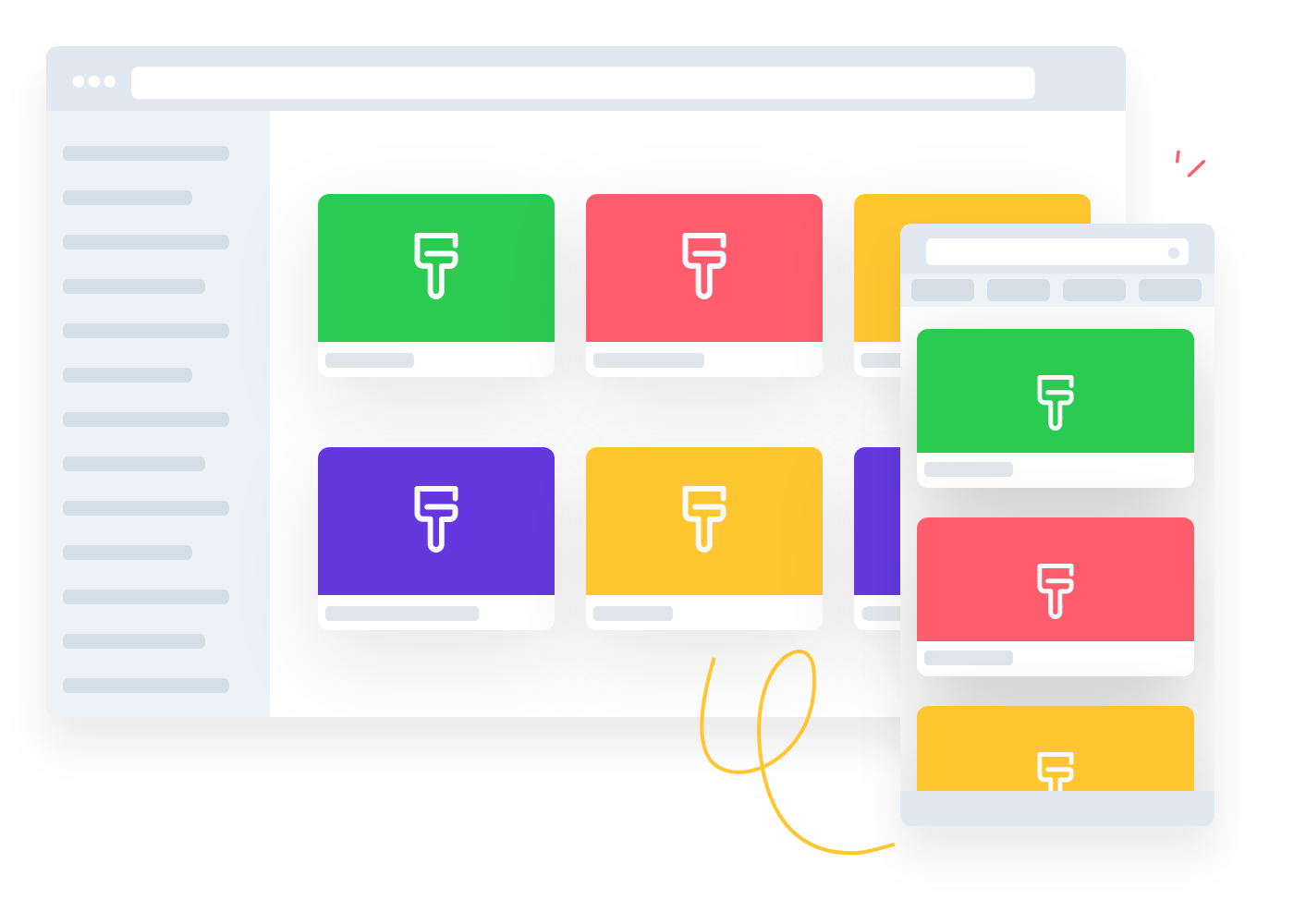Creating blogs, a good idea?

Have you just ended up on a blog post about starting your own blog? Sure you did! That's because we here at Combell have already figured out the great value of creating your own blog. Maybe you want to create a personal blog or rather one for marketing your company? With our tips, you can do so immediately and successfully.
- Why create a blog?
- Benefits of blog creation
- Create your own blog: choose a subject
- How to create a blog?
- Have a blog created or build your own
- Choose a blogging platform
- Create your own blog with WordPress
- Create your own blog with SiteBuilder
- How to create a free blog?
- Starting your own blog: start designing it!
- Posting content on your own blog
- Building an audience
- How to start your own blog and make money with it
- Additional tips on starting your own blog
- Frequently asked questions about blog creation
Why create a blog?
We'll get right to the point: yes, it's a good idea to start an online blog. There you have your answer to the title of this blog page. Were you thinking of clicking away right away? Think again. Creating your own blog (website) involves a lot of things. So stick around for much more information and concrete tips about creating a blog.
Starting a personal blog
You can actually blog in two types of ways: as a hobby to share thoughts and ideas with others. Or as a business owner to communicate with your customers. Or sometimes one comes from the other ...
Creating a private blog is a way to express yourself online. Not only are you doing self-expression, you are also reaching like-minded souls with it. Who knows, you might turn out to be a real influencer! Feel the urge to write? Then starting your own blog is a smart way to develop your writing talent.
Your blog posts can later form your own portfolio. That way, you can immediately put something concrete on the table when you go to apply for that job of your dreams. Say you have your own fashion blog and hope to work at a fashion magazine someday. Then you are already one step ahead of the other candidates!
Making a business blog
Starting a business blog does not mean writing everything boring and solemn. No, we mean that you can start a blog to communicate with your customers as a business.
In fact, a blog is a powerful tool for building authority and credibility in your industry. For example, you can write articles about possible problems that your customers may well face. If you also provide solutions, that will only improve customer satisfaction.
By regularly writing and sharing blog posts that are clearly linked to your field, you as a business owner can position yourself as an expert within the industry. For example, a sports store with a blog full of tips, facts and interviews about healthy living and exercise. Starting an online blog (also sometimes called "creating a weblog"), by the way, is also a way to get more internet traffic on your business website.
If you write valuable and relevant content, you will appear higher in the search results of Google and others. You can even give that ranking a helping hand, by using search engine optimization (SEO).
Actually, a blog should be a part of your business marketing. Because with your blog page, you are betting on different forms of business communication: promotion, feedback, customer trust, expertise ...
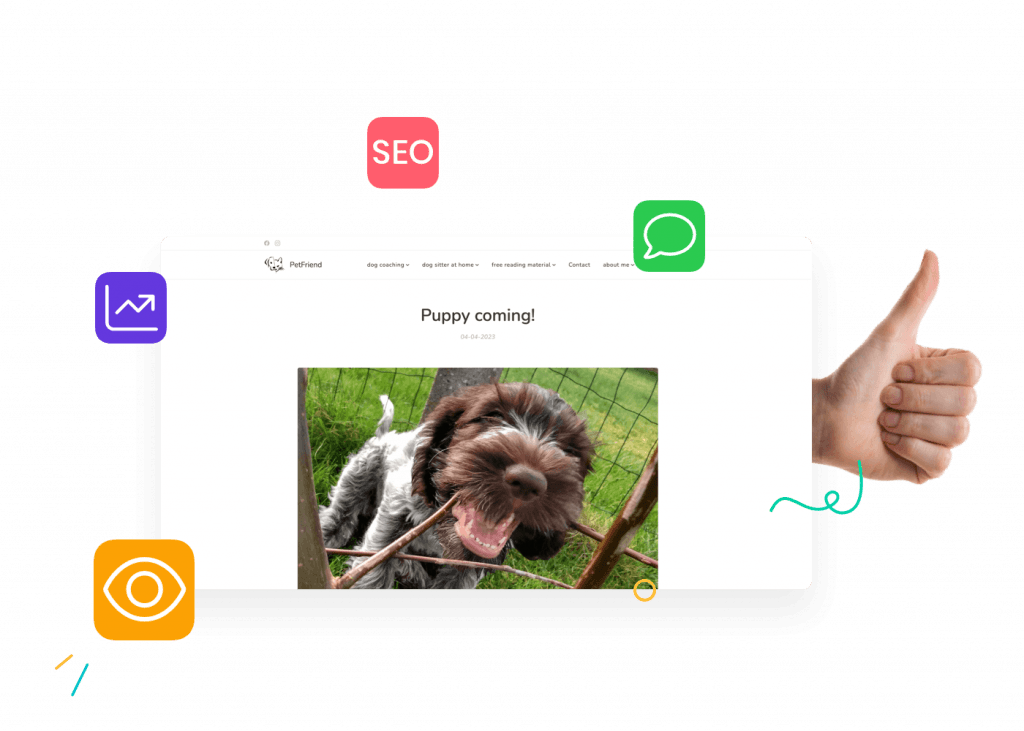
Benefits of blog creation
Five major benefits of creating a blog nicely put together:
Create your own blog: choose a subject
How do I create a blog? By knowing what you are going to write about! 😄 For a company blog, it's pretty simple: respond to what's going on with your target audience. For example, as a hosting provider, Combell will not suddenly start writing about snooker or vegan cat food. Although we would stand out, right? 😄
Here, you can read all the benefits of buying a domain name from Combell, what costs webshops entail, working in the cloud... All things you can count on with Combell and which we are only too happy to inform you about.
Niche or broad theme?
Should you choose a niche or a broad theme for your blog? Here are some points to consider:
Timeless or trending?
The success of your blog hinges on creating great content. But what types of content should you focus on?
Types of content:
A content calender as your guiding tool
To consistently produce fresh content, a content calendar is essential. Use tools like the Flexmail content calendar to plan your topics and publishing dates. This structured approach helps you stay organized and ensures regular updates for your audience.

Be passionate
So to choose the topic of your blog, the main thing you need to know is what you are good at or have a lot to say about. Ideally so passionate that you want to write regularly posts about it. What is your favorite hobby, what does your mouth not stop talking about for five minutes? First and foremost, write about something that excites you.
That not only works to motivate you, you can more easily determine your target audience. Ah yes, because you are part of it yourself! An even better idea: create a blog on a topic you have a lot of knowledge about.
It's a good idea to blog on topics in which you have a certain amount of expertise. That way, you will put valuable and credible content online, and you will position yourself as a trusted source.
If you are knowledgeable and passionate, you will probably know of other blogs that create similar content. Analyze them and find out what topics are popular. Or immediately discover an original angle that no one is currently talking about.
Looking for more inspiration? Then hold a brainstorming session with yourself, write down all your ideas or - for advanced users - do some keyword research.

How to create a blog?
Immediately, a big step: creating a blog page. There's a lot involved in this, but fortunately it doesn't have to be complicated. Once you know what you want to write about, choose a nice name for your blog.
You can then use that name for your domain name. Because you need to register a domain name when you start using web space at a hosting provider. But more on that later.
Finally, you need to design your blog and start publishing posts. With the right effort and strategy, you can create a successful blog that is a valuable source of information and inspiration for your readers. 😀
Choosing the perfect domain name for your blog
Your blog’s domain name is your online business card. It should be easy to remember, relevant to your topic, and not too long. Here are some tips to help you pick the right one:
- Keep it short and simple: long names are harder to remember and less user-friendly.
- Choose a unique name: make sure the name is still available and not already in use.
- Include relevant keywords: this can boost your blog’s search engine optimization (SEO).
No inspiration? Try the Combell business name generator to quickly find a unique and fitting domain name. AI does the trick!
Finally, design your blog and start publishing posts. With the right effort and strategy, you can create a successful blog that becomes a valuable source of information and inspiration for your readers. 😀
Have a blog created or build your own
Picked a domain name? Check! Now you have to ask yourself the question whether you are going to build that blog yourself or have it created by a reliable agency. The biggest difference is - you might guess - the cost at the end of the day.
Of course, the custom-built blog has several advantages. For example, you get a unique design that you have full control over, as well as all kinds of plugins to expand your blog and a blog that is also strong technically.
Not to mention all the time you can save because you don't have to create your blog page yourself.
Before outsourcing, be sure to create your own bill first. It may well be that such an expensive (but useful) investment is beyond your means for now. Therefore, it is worth taking other paths: namely, building your own blog.
Choose a blogging platform
You can start your own blog thanks to a blogging platform. That's basically the "blog software" that your own blog runs on. This is an important decision. After all, the blog platform you choose determines the features, appearance and user experience of your blog.
So think carefully about the right blogging platform. Choose software that fits the blog you have in mind. What is important to your blog? What experience do you want to give your readers? With the right blogging platform, you can take your own blog page to the next level.
Combell recommends two blogging platforms. With WordPress and SiteBuilder, you can create the best blogs. Learn more about each blog platform:
Create your own blog with WordPress
WordPress is one of the easiest ways to create your own website, for those with a small technical base. WordPress is by far the most popular Content Management System (CMS). Such a CMS makes it easy for you to build your own website. It is a tool that helps you manage and create content on your website.
The biggest advantage of WordPress is that the platform itself is completely free: you don't have to pay anything for the CMS itself. And there are many free WordPress themes and plugins available, which can give your website a lot of extra functionality.
Tip
Want to use WordPress? Then all you need is a domain name. And hosting! With Combell, you can choose web hosting on which you can install WordPress yourself with just one click and/or for WordPress hosting where WordPress is already pre-installed. With our WordPress hosting, a number of other things are also optimized for the performance and security of your WordPress blog.
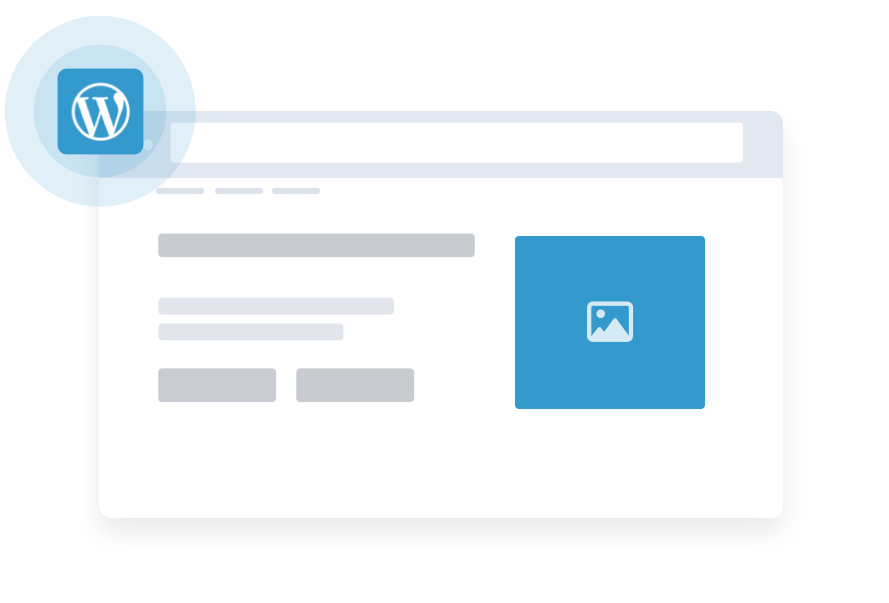
Advantages WordPress:
Disadvantages WordPress:
Tip
How do I create a blog with technical support? With Combell, of course! All our customers have access to our excellent 24/7 support. Our colleagues will help you with any problems and questions.
Tip
Don't feel like having to deal with that endless stream of WordPress updates? With Managed WordPress hosting, that's completely a thing of the past. We keep your website in top condition, while you don't have to worry about it anymore.
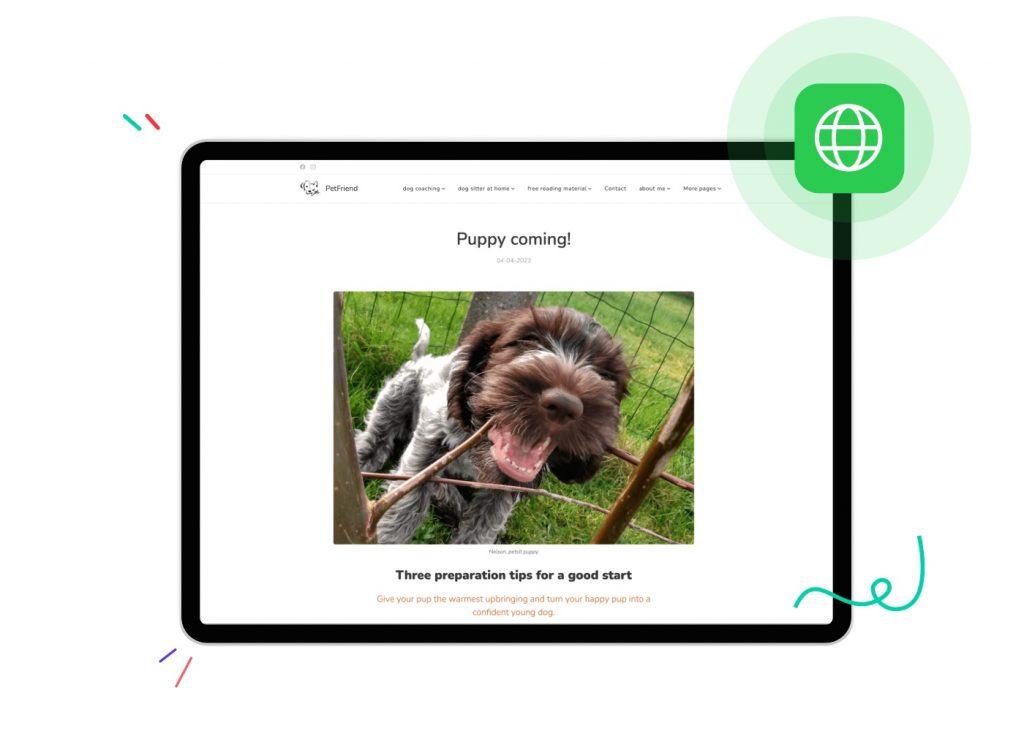
Create your own blog with SiteBuilder
SiteBuilder is Combell's golden tip for anyone who wants to start a blog easily, quickly and, above all, on a budget. Feel free to call it our alternative to Wix.
With this user-friendly package, you can immediately create your own blog. And no, you do not need to have any technical knowledge. Still stuck? We are ready to help you day and night. And how about free training!
Try it yourself first before outsourcing your website. SiteBuilder is affordable, it's well worth the investment.
You build your own blog whenever and wherever you want. You are in charge. You don't have to bother anyone when you want to update the blog pages. SiteBuilder totally lives up to its name as a website builder. With this blog software you get all the building blocks to create your blog.
Benefits SiteBuilder:
Disadvantages of SiteBuilder:
P.S.: There are, of course, other platforms and packages. For example, with paid subscriptions (premium subscriptions), you can start blogging right away there too.
Tip
SiteBuilder has been enhanced with an AI website builder. You no longer have to build your website yourself; the Artificial Intelligence does it for you! Try it now.
How to create a free blog?
"'What is Combell babbling about creating a blog? I can just start a free blog, right?" We shouldn't sound silly about that. You can indeed create a free blog on several platforms. But that's actually not such a good idea. Especially not for entrepreneurs who create a blog to present themselves professionally.
It starts with your own domain name. Starting a blog for free means you only have a subdomain. No domain of your own. So the brand of the free blogging platform will always appear along in the address bar of your blog. That looks rather clumsy.
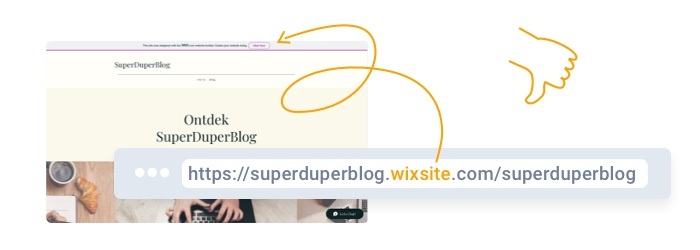
Your blog will also be filled with advertising. Of which the income goes to the blogging platform. Or even worse, the free blogging platform will shut down and you will lose access to your own blog.
Create a blog for free? Yes, but with limitations
Creating a free blog also entails limitations. Not much disk space, limited possibilities to personalize your blog page, slower loading time compared to a professional blog ...
Plus, SEO features are limited, so your blog won't rank super high in Google. Oh, and don't think you will be able to count on as good support as with Combell. In other words, we are not fans of a free blog (site). And no, we are not saying that because we are a hosting provider ourselves.
For us, it is quite simple: your own blog - whether it is a small hobby project or a company blog - must have the best facilities. As a matter of fact, there are plenty of Ugly Belgian Websites already. Though even within a good setting, a dreadfully ugly website can always be made.
Starting your own blog: start designing it!
So we can only recommend choosing a solid blogging platform. After that, it's time to design your blog. The details depend on the software you have chosen. Regardless of your chosen blog platform, it is very important to think carefully about the exact design of your blog. Because the layout determines the look and feel of your blog. And you know what they say about that first impression ...
Choose a template
Most startups without much technical knowledge choose a template. That's a kind of preliminary design that doesn't require you to start from scratch.Take the time to browse through the different templates. It will help you eventually choose a blog template with the right features, menus, plugins ... that suit your blog.
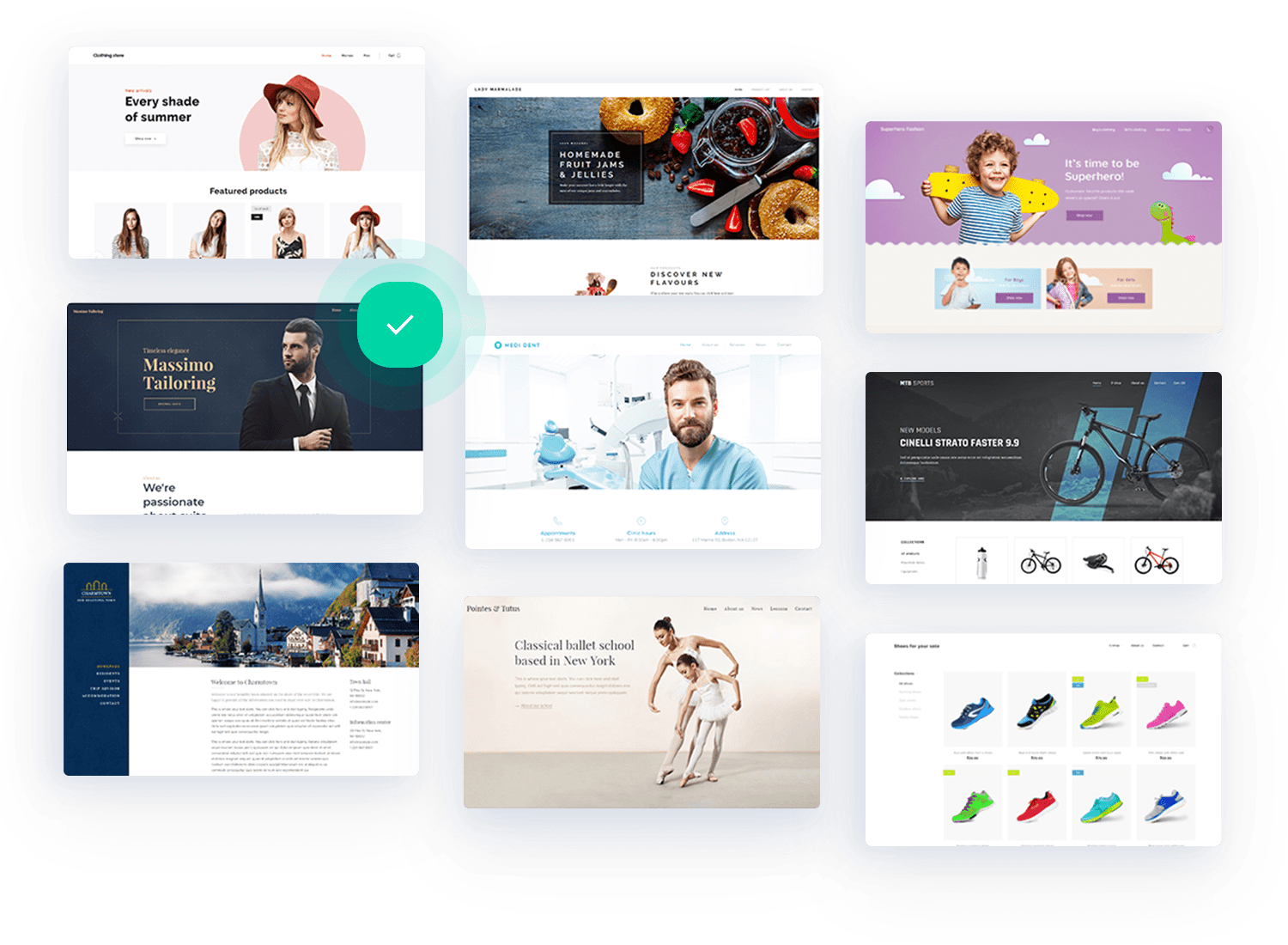
Adjust colors and fonts
The one thing you shouldn't overlook: your blog's color scheme and font. It might well be that the original colors of the template do not match your online look.
For example, it would be very strange if you start blogging about love and relationships and only black colors show up on your blog page. With the right colors, you will be able to convey atmosphere and emotion. Tell me: you prefer a visually appealing blog too, don't you?
Plus, the right font is important for the readability of your blog. Test out different fonts (don't do it while your blog is already online). Although you may skip Comic Sans right away. 😉
With consistency in font and color usage, you can build a recognizable brand identity and set your blog apart from others. Bottom line: an appropriate font and colors contribute to the professionalism, readability and visual appeal of your blog.
Tip
We assume you want to create a visually appealing blog. Right? Then check out our 8 tips for a beautiful website!
Add images and other media
Let us give you a tip right away: don't play around too lavishly with images and other media on your blog. The number actually depends on the type of blog. If your blog is about photography, then of course it is obvious that there will be a lot of pictures.
Videos quickly make your blog page heavy. Not just figuratively, also literally. Websites with slow load times often have to load way too many media files.
For adding images, your chosen blog platform again plays an important role. At SiteBuilder, for example, you can add images to your blog for free. Other platforms even have special plugins for it.
Posting content on your own blog
Stretch those fingers. Time to put that first blog post online! Once you've defined your topic, you'll immediately know what to write about. Unleash your creativity. Share your story with your audience.
If you're launching a corporate blog, make thoughtful choices about your first posts. For instance, don't start right away writing about the most difficult topics. Keep it fun!
SEO in mind
You may need to be creative, but keep search engine optimization of your blog posts in mind as well. After all, you want to be read. Otherwise, you shouldn't create a private blog, but rather a diary. 😃
Take SEO into account by paying attention to your ( sub) titles, integrating keywords and tags in the SEO options of your blog platform. As a result, you will rank higher in the search results of Google, among others.
Therefore, through that way, audiences will land on your blog. There is also a good chance that those readers will immediately be interested in what you have to say. After all, they came to your blog via relevant keywords.
Building an audience
Dare to click the publish button? Your first blog post is online. Congratulations. 😉 Still, you don't have time to rest on your laurels. After all, you need to advertise your blog. SEO does the trick, but it doesn't stop there.
First and foremost, share your blog page within your own network. So leverage your accounts on social media. Schedule your published posts at strategic times. After all, someone is more likely to read your post during their lunch break than at 2 p.m., in the middle of the day.
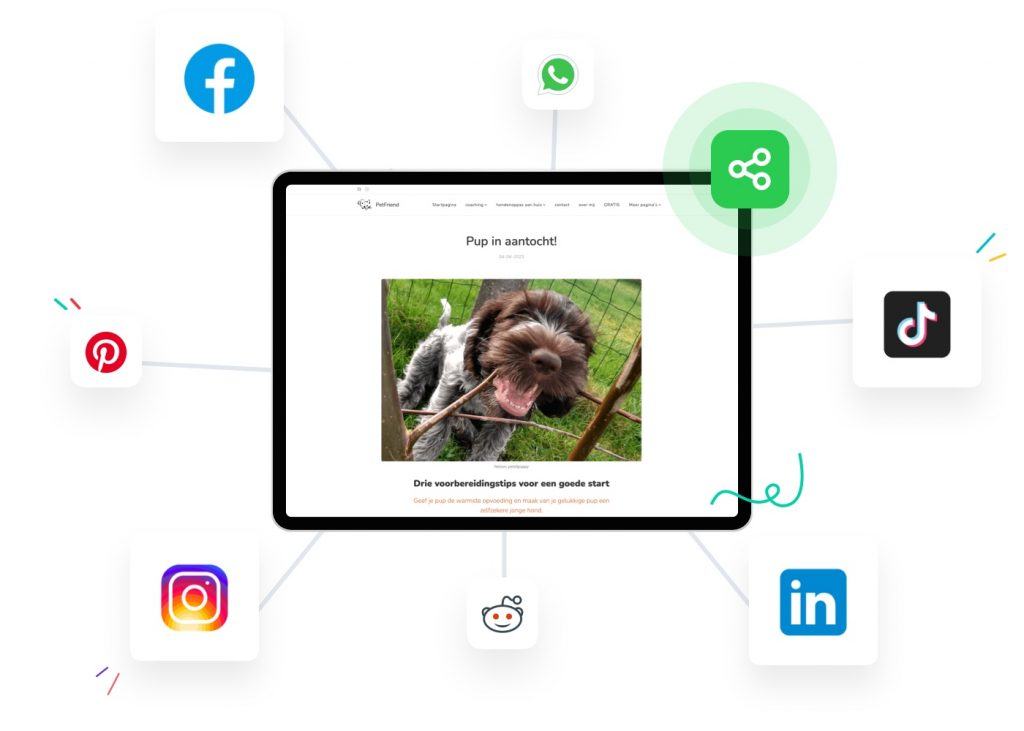
To find out who your readers are, which posts are popular ... you can use the statistics integrated in your blog software. Or make use of Google Analytics!
Using email marketing
Another effective way to promote your blog posts is e-mail marketing. Good news: every Combell customer gets a free Flexmail account.

With Flexmail's email marketing tool, you design professional emails and campaigns and send them to the right contacts. Sending newsletters and promotions through Flexmail is a great example of taking control of your marketing.
Some other tips for promoting your blog:
How to start your own blog and make money with it
Making money with your personal blog? It's only logical that you have ears for that. There are several ways to get income from your blog. Although that should certainly not be your biggest motivation to start a blog page.
Blogs that are maintained with passion and have strong content will sooner or later be picked up. Who knows, maybe even by a generous sponsor.

About the different business models:
- You can sell advertising space on your blog to advertisers. You do this, for example, through Google AdSense or through direct partnerships with companies. Every time visitors click on the ads or the ads are displayed, you receive a (small) fee.
- By including affiliate links in your blog posts, you can earn a commission when readers buy products or services through those links. You can sign up with different affiliate networks and promote products or services relevant to your niche audience. You can even become an Affiliate Partner of Combell!
- You can collaborate with brands and companies to create sponsored content. So, like a real influencer. This means that you get paid to write blog posts that promote the sponsor's products, services or events. It is important to clearly state that the content is sponsored to remain transparent to your audience.
- Starting a webshop. For example, do you blog about clothes, candles or other products? Then you can start selling them yourself, for example. You can use your blog to build authority and credibility and while promoting your digital products.
Tip
If you create your blog with WordPress or SiteBuilder, you can easily expand to a webshop.
Additional tips on starting your own blog
So! You now have all the knowledge you need to start your own blog. Here at Combell, we cannot wait to get started together. Registering your domain name, helping you find the best hosting, providing blog software... We have everything you need right here!
Here are four more tips for your blog!
